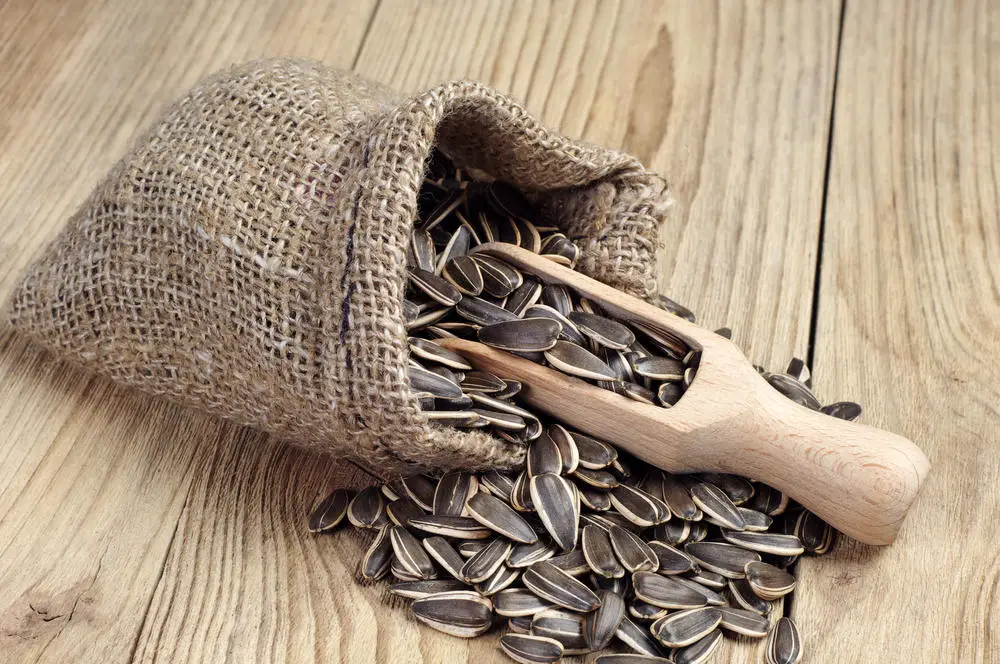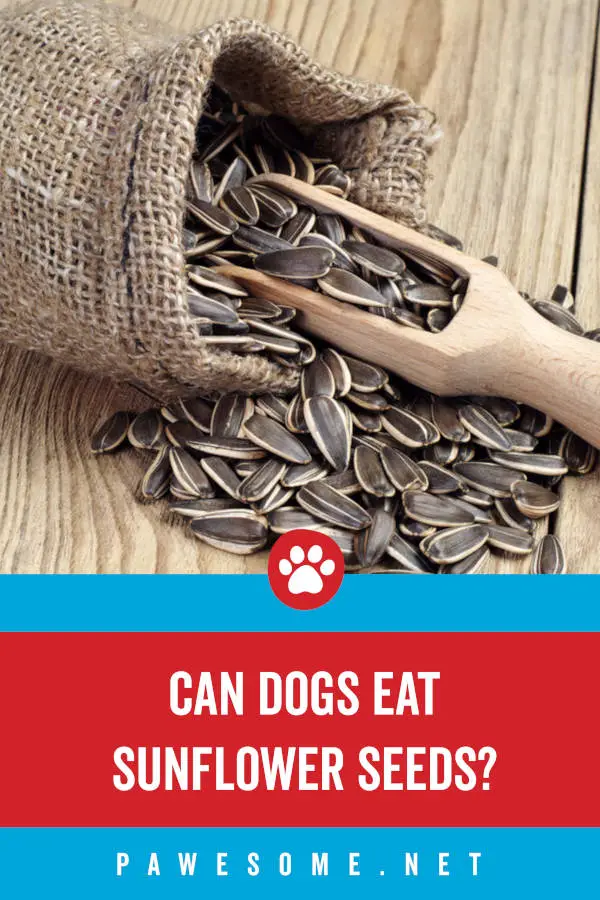
Don’t we all love crunchy sunflower seeds? These delicious and nutty seeds are great summertime snacks and apart from being extremely delicious, sunflower seeds are a great nutritious source of vitamins, minerals, fatty acids and proteins for humans.
However, can dogs eat sunflower seeds or are they bad for them? Dogs can eat sunflower seeds; however, with a few limitations. In this article, we will discuss what sunflower seeds are, how safe they are for dogs, advantages and possible side effects.
What Are Sunflower Seeds and Can They Be Eaten by Dogs?
Sunflower seeds are obtained from the sunflower, which is an herbaceous plant belonging to the Asteraceae family. Sunflowers are native to the central regions of America and have become a popular crop worldwide. The sunflower comprises of two types of flowers. The flowers on the perimeter consist of yellow petals and the center is comprised of hundreds of small fertile brown-colored flowers. Sunflower seeds grow from the middle portion of the sunflower.
Sunflower seeds have a conical shape with a hard outer shell and a kernel inside that is edible. Sunflower seeds are great to taste and are nutritious too. However, can dogs also eat sunflower seeds and gain nutritional benefits?
Dogs can eat sunflower seeds without any problems, as long as you feed it to them correctly. These seeds are an excellent source of healthy fatty acids, minerals and vitamins that we will discuss in more detail below.
The most important thing is that when you’re feeding your pet dog any seed, sunflower or any other, they should always be peeled and should not be salted. Your pooch can eat the sunflower kernel but not the black shell of the seeds because they can cause severe gastrointestinal distress and diarrhea. Just as in humans, high salt content in the seeds can cause problems such as high blood pressure in dogs too.
Related: Can Dogs Eat Okra?
What Are the Benefits of Eating Sunflower Seeds in Dogs?
Sunflower seeds by themselves are highly nutritious and ¼ cup of shelled sunflower seeds contains 6 g of protein, 4 g of fiber, 16 g of fats and 190 calories. These seeds are packed with vitamins and minerals such as vitamin E, B1, B6, B3, folate, copper, selenium, manganese, magnesium and phosphorus.
Can dogs eat sunflower seeds and gain the same advantages as humans? Yes, studies reveal that eating sunflower seeds can be beneficial to dogs and help to improve their skin and coat hair. Research shows that the oil and other components in sunflower seeds such as linolenic acid can have beneficial effects on dogs. Let us now look at some other benefits of sunflower seeds for dogs.
Improves the Skin and Coat
As we discussed earlier, studies reveal that there were improvements in dogs’ skin and hair coat after they ate sunflower seeds for a while. Since sunflower seeds have essential fatty acids, eating sunflower seeds continuously can help to improve the healthy coat and skin of your dog. The fats contained in sunflower seeds are healthy, unsaturated fats that are good for your pet. These fats help to keep your pet’s coat healthy, full and shiny and prevent problems such as dry skin, hot spots, etc.
Helps in the Production of Good Cholesterol
The healthy fatty acids in the sunflower seeds help the body to reduce the production of bad cholesterol and improve good cholesterol levels. This helps to lower your dog’s blood pressure, which in turn, reduces the risk of heart disease and stroke.
Antioxidants
Sunflower seeds contain vitamin E and just 1 oz of sunflower seeds provides your pet’s daily dose of this vitamin. The vitamin E helps in managing cholesterol levels and is also essential for fat metabolism, cell respiration and also helps in the creation of cell membranes. Vitamin E also helps to protect your pet from harmful radicals.
Helps to Relieve Stress and Depression
Just as in humans, sunflower seeds also have a calming effect on dogs experiencing anxiety. Sunflower seeds contain magnesium, which helps to alleviate fatigue, stress and depression. The seeds are packed with B vitamins, especially pyridoxine and niacin, both of which help to improve brain activity and reduce anxiety and neurosis.
Sunflower seeds have a high tryptophan content, which is an essential amino acid that increases the serotonin level in the dog’s brain. The serotonin helps to improve the dog’s recovery from stress and also helps to reduce aggressive behavior.
Improves Overall Health
Sunflower seeds are chock full of a variety of antioxidants, vitamins, minerals and other vital nutrients, all of which are an excellent addition to your pet’s diet as they can help to promote production of hemoglobin, healthy bones, production of hormones, brain function, immune function, proper use of carbohydrates, proteins and enzymes, reproduction, immune system and development of bones, red blood cells, connective tissue and collagen.
Related: Can Dogs Eat Pomegranate?
Harmful Effects of Sunflower Seeds in Dogs
Eating sunflower seeds can have several beneficial benefits in dogs; however, the key is moderation. Ensure that the sunflower seeds they eat are peeled and do not contain salt. Generally, dogs love eating sunflower seeds, which makes a great snack or you can add them to your pet’s meals. However, when feeding sunflower seeds to your dog, you must watch out for some side effects.
Salted Sunflower Seeds are Toxic for Dogs
Usually, the sunflower seeds that we humans consume are salted. While, by themselves, salted sunflower seeds are not toxic, a high level of salt in your pet’s diet can cause serious health issues such as sodium toxicosis, which can range from mild to severe, the symptoms of which include extreme thirst, repeated urination, vomiting, diarrhea, imbalance, seizures and even death.
Sunflower Seed Shells Can Cause Gastrointestinal Distress
Sunflower seed shells and hulls are dangerous for your pet. Your pet cannot chew the unshelled seeds and spit the shells out like humans, which can pose a choking hazard and if the hulls are not chewed properly, they can cause a stomach ache. Unshelled sunflower seeds are not easily digestible and if they get stuck in the gastrointestinal tract, they can cause obstruction or blockage, which can even be life threatening.
Excessive Amount of Oil in Sunflower Seeds Can Be Harmful
Sunflower seeds are high in fats which can be difficult for the dog’s digestive system to break down and can be harsh on your pet’s stomach. Consuming a large number of sunflower seeds can cause diarrhea and vomiting. It can also cause inflammation of the pancreas in a puppy or a small dog. So, if your pet has consumed a lot of sunflower seeds, then it is a good idea to take him to your vet.
Hypersensitivity or Allergy to Sunflower Seeds
Your pet may be sensitive or allergic to some part of the sunflower seeds, which can result in repeated vomiting or your pet becoming very lethargic. If this occurs, take your pet to the vet immediately. It is always a good idea to check if your pet is allergic to sunflower seeds by feeding him around 3-5 seeds as a snack. However, if your dog shows any signs of being allergic or hypersensitive to the seeds, you can opt for other sources of fatty acids and vitamin E such as eggs, fish, red meat, coconut oil or flax seeds.
Also Read: Can Dogs Have Sunflower Oil?
How Much Sunflower Seeds Should You Give Your Dog?
A cup (46 grams) of sunflower seeds contains 269 calories. So, when feeding your dog sunflower seeds, you must pay attention to the quantities. It is recommended that for a small dog, you do not give more than 10-20 seeds and for a large dog not more than 20-40 in a week. While this may not seem a lot, it is not advised to feed them more than this. You can use the recommended amounts of sunflower seeds to make cookies or other treats for your pet.
Apart from being high in calories, sunflower seeds are also high in fats and eating too many seeds can cause serious health issues for your pet. If you’re giving your pet sunflower seed butter or sunflower seed oil, you must take care that the quantities of these are even smaller, because they are even higher in calories and fats as compared to sunflower seeds. You can calculate your pet’s daily calorie requirements by using the formula below:
Daily calorie requirement = 30 x the weight of your dog (in kilos) + 70.
So, in short, dogs can eat sunflower seeds without any problems, provided that they eat them in moderation and are fed with care. When eaten in moderation, sunflower seeds can help to boost your pet’s health because of the vitamins and minerals that are contained in the seeds.
However, you must take extra care to ensure that you buy only natural sunflower seeds without any added salt, flavorings or spices. You must ensure that the sunflower seeds are peeled and the shells and hulls are removed before your pet eats them. If you do all these things, sunflower seeds can be beneficial and good for your dog’s overall health.

